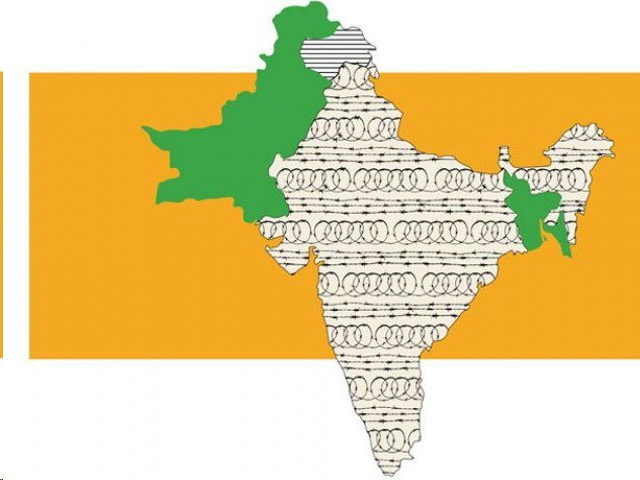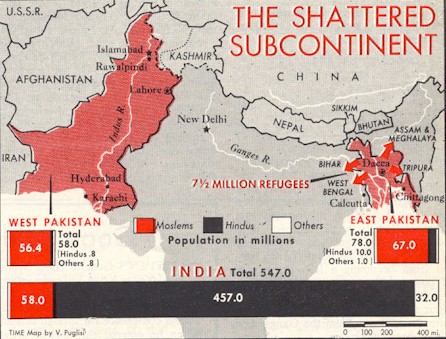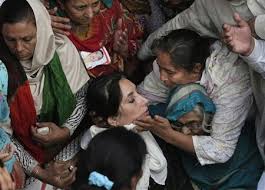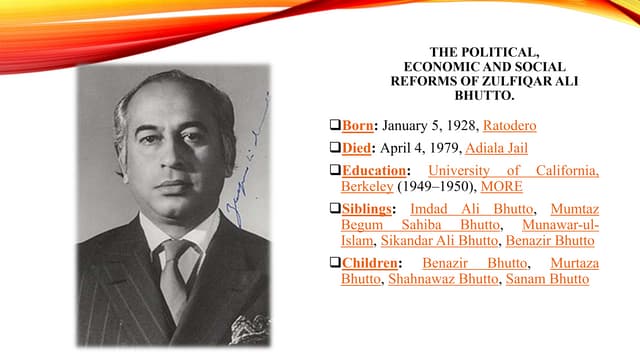A reflective exploration of key historical events in Pakistan - the disintegration of East Pakistan, the tragic APS incident, and the ma...
A reflective exploration of key historical events in Pakistan - the disintegration of East Pakistan, the tragic APS incident, and the martyrdom of Benazir Bhutto - highlighting the challenges, consequences, and the need for remembrance and justice.
سقوط ڈھاکہ، اے پی ایس کا سانحہ اور بے نظیر کی شہادت
· دسمبر کے مہینے میں، ہماری قومی تاریخ کے اہم واقعات سامنے آئے، ایسے واقعات جنہیں ہم میں سے بہت سے لوگ فراموش نہیں کر سکے ہیں اور شاید کبھی نہیں ہوں گے۔ 16 دسمبر 1971 کو قائداعظم کا پاکستان ٹوٹ گیا۔ بدقسمتی سے، ان واقعات کو معروضی طور پر دیکھنے اور دستاویز کرنے کے بجائے، مورخین ابھی تک یہ طے نہیں کر پائے کہ مشرقی پاکستان میں ہونے والے سانحے کا اصل ذمہ دار کون تھا۔
· اس سانحہ میں شامل بیشتر افراد اس جہان فانی سے کوچ کر چکے ہیں۔ راولپنڈی اور اسلام آباد میں شاید واحد صحافی ہونے کے ناطے مجھے ایوب خان کے خلاف طلبہ کی تحریک کے دوران 'بنگلہ بندو' شیخ مجیب الرحمان سے اپنی ملاقات یاد ہے۔ اس وقت ایوب خان نے ڈیموکریٹک ایکشن کمیٹی کی قیادت کے مطالبے پر اگرتلہ سازش کیس میں گرفتار شیخ مجیب الرحمان کو رہا کر دیا تھا۔
· ایک متاثر کن شخصیت شیخ مجیب الرحمن نے 1966 میں اپنے 6 نکات پیش کیے اور اگرتلہ سازش ایک قابل ذکر واقعہ بن گئی۔ اس وقت کے 6 نکات کا ذکر غداری اور پاکستان کو تقسیم کرنے کی سازش سمجھا جاتا تھا۔ پاکستان کے دونوں حصوں میں سیاسی قیادت کی کسی تصفیے تک پہنچنے میں ناکامی، اور شیخ مجیب الرحمان کی جانب سے بغاوت کو کچلنے کے لیے ریاستی طاقت کا استعمال، بالآخر بنگلہ دیش کے قیام کا باعث بنا۔
· اگر 6 نکات پر نظر ثانی کرنے اور ذوالفقار علی بھٹو شیخ مجیب کو وزیراعظم کے طور پر قبول کرنے پر آمادہ ہوتے تو پاکستان متحد رہتا۔ بدقسمتی سے، سیاسی تنازعہ بڑھ گیا، جس کے نتیجے میں فوجی آپریشن شروع ہوا۔ پاکستانی فوج، جن کی تعداد 35 ہزار تھی، کو 5 لاکھ بھارتی فوج کے سامنے ہتھیار ڈالنے پڑے، جبکہ پورے مشرقی حصے نے مکتی باہنی کی صورت میں مسلح افواج کے خلاف مزاحمت کی۔
· حمود الرحمان کمیشن کی رپورٹ کے پبلک ہونے کے باوجود، جس کا میں نے کابینہ ڈویژن میں بڑے پیمانے پر مطالعہ کیا، پاکستان کے ٹوٹنے کی بنیادی وجہ، سیاسی تصفیہ کی ناکامی، پر توجہ نہیں دی گئی۔
·
1994 میں، ڈھاکہ میں راولپنڈی اسلام آباد پریس
کلب کی نمائندگی کرتے ہوئے، میں نے ایسے افراد سے ملاقات کی جو آج بھی پاکستان کو
اپنے دلوں میں عزیز رکھتے ہیں۔ سانحہ مشرقی پاکستان کو حکومتی سطح پر دستاویزی شکل
دی جائے، متحدہ پاکستان کے لیے اپنی جانوں کا نذرانہ پیش کرنے والے شہداء کی یادگاریں
تعمیر کی جائیں۔
· آج سے نو سال قبل آرمی پبلک سکول پشاور کے طلباء کے ساتھ ہونے والی بربریت ہماری یادوں میں نقش ہے۔ دہشت گردی کے اس واقعے کے کچھ مجرموں کو انصاف کا سامنا کرنے کے باوجود ان بچوں کے والدین غم و غصہ کو محسوس کر رہے ہیں۔ تاہم، یہ افسوسناک ہے کہ پاکستان میں اب بھی ایسے افراد موجود ہیں جو دہشت گردوں سے ہمدردی رکھتے ہیں۔ بحیثیت قوم ہمیں دہشت گردی کے خلاف زیرو ٹالرنس کا موقف اپنانا چاہیے، اس بات کو یقینی بنانا چاہیے کہ ہمارے معاشرے میں دہشت گردوں کے لیے کوئی جگہ نہ ہو۔
· 27 دسمبر 2007 کو سابق وزیراعظم بے نظیر بھٹو کو کولیاقت باغ میں جلسہ عام میں شہید کر دیا گیا۔ مجھے ایک انٹرویو کے دوران لندن میں بے نظیر بھٹو سے ملنے کا موقع ملا۔ اپنی جان کو لاحق خطرے سے آگاہ ہونے کے باوجود، وہ پاکستان واپس آئی اور کراچی میں ہونے والے ایک بم دھماکے میں بال بال بچ گئی۔ تاہم، اس کی قسمت نے 27 دسمبر 2007 کو لیاقت باغ میں اس کا ساتھ دیا، جہاں لیاقت علی خان کو برسوں پہلے شہید کر دیا گیا تھا۔
·
بے نظیر بھٹو کے قاتل 17 سال گزرنے کے
باوجود نامعلوم اور ناقابل سزا ہیں۔ ذوالفقار علی بھٹو کو جس پھانسی پر ایک بار
ڈسٹرکٹ جیل راولپنڈی میں رکھا گیا تھا وہ یادداشت سے مٹ چکا ہے، جو انصاف اور
احتساب کو یقینی بنانے میں درپیش چیلنجوں کی واضح یاد دہانی ہے۔
The Fall
of Dhaka, the Tragedy of APS, and the Martyrdom of Benazir
In the month of December, significant events in our national history
unfolded, events that many of us have not been able to forget and likely never
will. On December 16, 1971, Quaid-e-Azam's Pakistan disintegrated.
Unfortunately, instead of witnessing and documenting these events objectively,
historians have yet to definitively determine who was truly responsible for the
tragedy in East Pakistan.
Most of the individuals involved in this tragedy have departed from this
world. As perhaps the sole journalist in Rawalpindi and Islamabad, I recall my
encounter with 'Bangla Bandu' Sheikh Mujib ur Rahman during the student movement
against Ayub Khan. At that time, Ayub Khan had released Sheikh Mujib ur Rahman,
who had been arrested in the Agartala Conspiracy case, due to the demand of the
Democratic Action Committee's leadership.
Sheikh Mujib ur Rahman, an inspiring personality, presented his 6 points in
1966, and the Agartala Conspiracy became a notable event. Mentioning the 6
points back then was considered treason and a conspiracy to divide Pakistan.
The failure of political leadership in both parts of Pakistan to reach a
settlement, coupled with Sheikh Mujib ur Rahman's use of state power to quash
the rebellion, eventually led to the creation of Bangladesh.
Had there been a willingness to revise the 6 points and for Zulfiqar Ali Bhutto
to accept Sheikh Mujib as Prime Minister, Pakistan might have remained united.
Unfortunately, the political conflict escalated, leading to a military
operation. The Pakistani army, numbering 35 thousand, had to surrender to the 5
lakh Indian army, while the entire eastern part, in the form of the Mukti
Bahini, resisted the armed forces.
Despite the public release of the Hamud ur Rehman Commission's report, which
I studied extensively in the Cabinet Division, the main reason for Pakistan's
disintegration, the failure of a political settlement, remained unaddressed.
In 1994, representing the Rawalpindi Islamabad Press Club in Dhaka, I met
individuals who still hold Pakistan dear in their hearts. The tragedy of East
Pakistan should be documented at the government level, with memorials erected
for the martyrs who sacrificed their lives for a united Pakistan.
The brutality suffered by the students of the Army Public School Peshawar,
nine years ago today, remains etched in our memory. The parents of these children
continue to feel the anguish, even though some perpetrators of this terrorist
incident have faced justice. However, it is disheartening that there are still
individuals in Pakistan who harbor sympathy for terrorists. As a nation, we
must adopt a stance of zero tolerance against terrorism, ensuring no room for
terrorists in our society.
On December 27, 2007, former Prime Minister Benazir Bhutto was martyred in a
public meeting in Liaqat Bagh. I had the opportunity to meet Benazir Bhutto
in London during an interview. Despite being aware of the threat to her life,
she returned to Pakistan and narrowly escaped a bomb blast in Karachi. However,
her fate caught up with her on December 27, 2007, in Liaquat Bagh, where
Liaquat Ali Khan had been martyred years before.
The killers of Benazir Bhutto, despite the passage of 17 years, remain
unidentified and unpunished. The gallows that once held Zulfiqar Ali Bhutto in
District Jail Rawalpindi have been erased from memory, a stark reminder of the
challenges in ensuring justice and accountability.











No comments